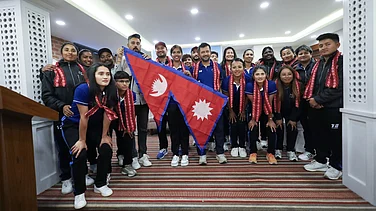At a time when the online gaming industry is groping in the dark on the quantum of GST it will pay, a draft version of the Rajasthan Virtual Online Sports (Regulation) Bill 2022 has set the cat among the pigeons. (More Sports News)
In a welcome move to bring legislation to regulate online skill-based games, the Rajasthan Virtual Online Sports (Regulation) Bill 2022 seems focused on fantasy sports and completely ignores popular pay-to-play casual games like ludo, rummy and poker.
There is of course some cheer for esports operators. The Bill, which is being seen as horribly lopsided by the industry, accommodates esports which is now a medal event in the Asian Games and recognised by the International Olympic Committee.
The 20-page draft looks tailormade for fantasy operators. Rajasthan has one of the highest concentrations (15-20 per cent) of the fantasy sports business.
"The draft Rajasthan Virtual Online Sports (Regulation) Bill, 2022 leaves a lot to be desired. It is unclear why the state government has decided to regulate only fantasy sports and esports while leaving out other skill-based games like rummy, poker etc," points out tech and gaming lawyer Jay Sayta.
In Chapter 3 dealing with the administration and regulation of virtual online sports, the draft interestingly makes provision for a 'private' self-regulatory body to work under a commission consisting of a retired High Court/Supreme Court judge, a retired government servant not below the rank of secretary and a person having vast experience in the field of sports and sports federations.
"We are still studying the proposed bill and will be reaching out to the Government of Rajasthan with our suggestions. Our preliminary view is that the bill in its current form may have some concerns from the perspective of casual games of skill which has been recognised by the Supreme Court of India as well as several High Courts. However, we are confident that the Rajasthan government will accommodate our concerns and the final law will be consistent with the law of the land as laid down by the courts," said Saumya Singh Rathore of Winzo.
UNFAIRPLAY
Industry sources are worried that if a private self-regulatory body enjoys sweeping powers like "to issue directions or orders for compliance with the code of ethics and governance and "to evaluate, certify and approve a format," it could lead to confusion and conflict of interest.
In the field of online gaming, the leading body is the All India Gaming Federation. It has about 60-plus members consisting of multi-gaming platforms like MPL, Paytm First Games and Games 24x7 among others.
Although they are disappointed at the first look at the draft, almost all gaming operators Outlook reached out to on Friday are observing a 'studied' silence.
The once-powerful Federation of Indian Fantasy Sports, founded by India's leading fantasy sports operator Dream11, recently lost three of its 'platinum' members MPL, My11Circle and MyTeam11. A couple of its top officials also quit.
BIG QUESTION
"It will be ridiculous that a body (FIFS) that used to be a registered subsidiary of the industry leader is now going to be imposing fines on other competitors and monitoring licenses," said a senior official of a top multi-gaming company.
Sayta agrees.
"Outsourcing the powers of regulation and monitoring of the state government to a private self-regulatory organisation is not appropriate or ideal.
"In my view, the state government should withdraw or substantially revise this draft Bill and bring a new comprehensive legislation for regulation of all forms of online gaming after widespread consultation with all stakeholders," adds Sayta.
In his budget speech in February, Rajasthan Chief Minister Ashok Gehlot had indicated his intention to regulate online skill based games/fantasy games. The industry had immediately suspected that powers to run the business may be bestowed to a chosen few.
FLAT BAT
Outlook's queries to the Chief Minister's office on the partisan attitude towards fantasy and licensing did not get any response.
It may be pertinent to mention that in December 2020, the NITI Aayog showed great enthusiasm to release a draft paper called the ‘Guiding Principles for the Uniform National-Level Regulation of Online Fantasy Sports Platforms in India’. This was probably the first attempt from a Central government agency to take stock of a rather errant industry.
The online gaming companies immediately objected to NITI Aayog’s partisan attitude towards fantasy cricket. The matter went to the cold and never saw the light of day.


























